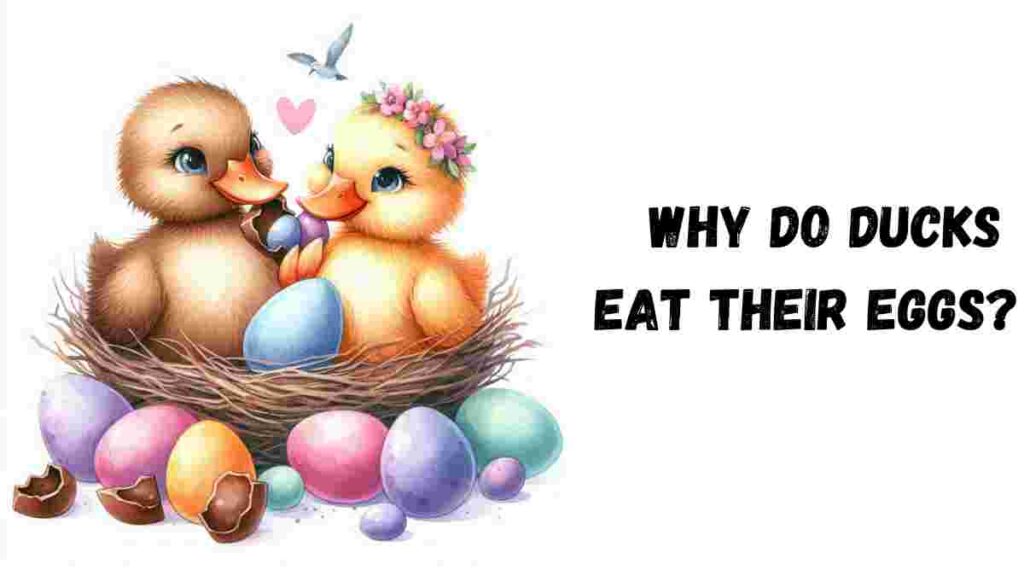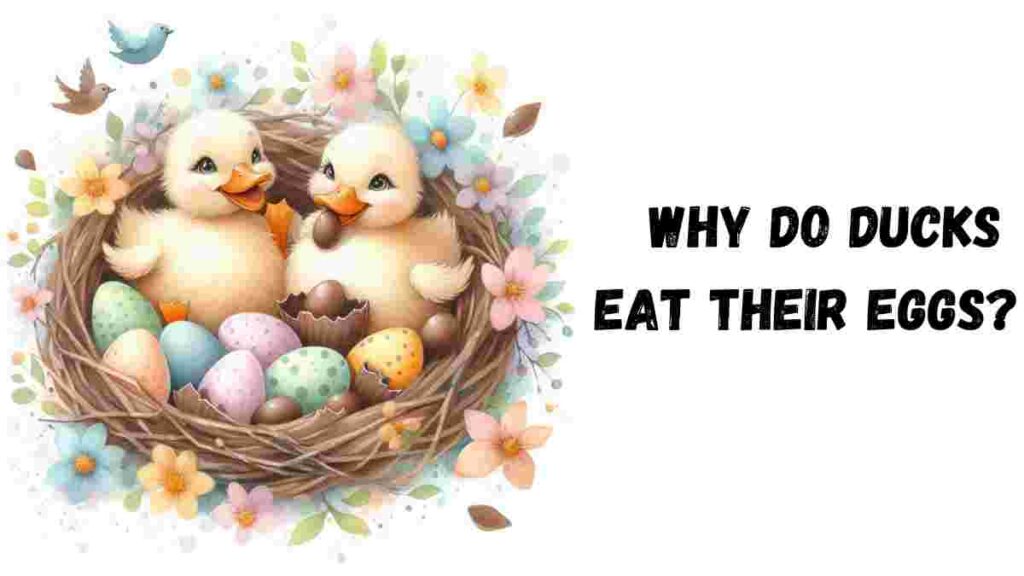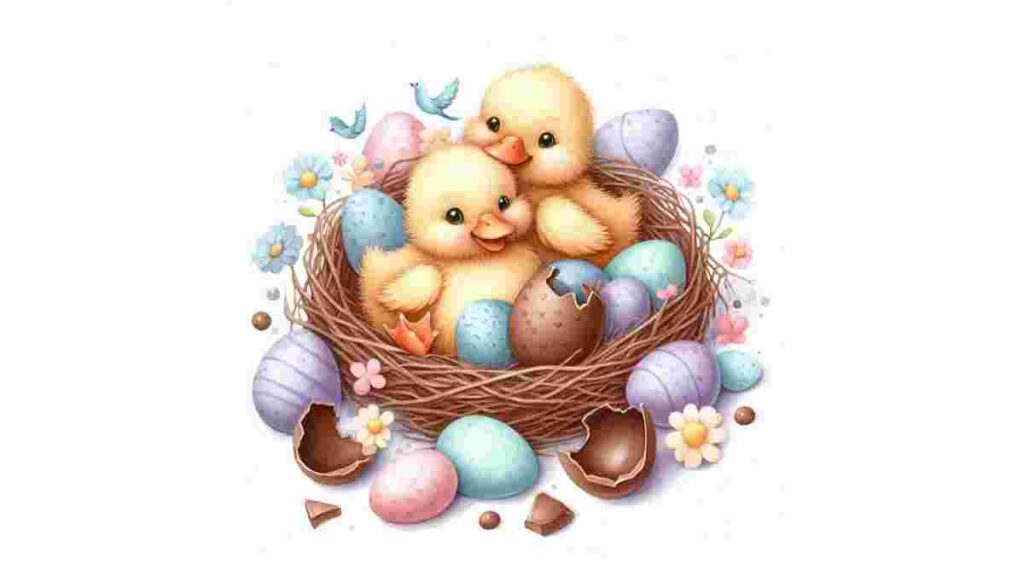Why Do Ducks Eat Their Eggs: The peculiar habit of ducks eating their eggs is more than just an oddity; it’s a behavioral pattern that can significantly affect egg production, a vital economic driver for duck farmers around the globe.
In this detailed exploration, we unpack the reasons behind this behavior and offer practical strategies to prevent and manage it. Whether you’re starting a hobby farm or managing a large poultry operation, understanding why ducks eat eggs is crucial knowledge.
Amazing Wooden Duck Houses At Reasonable Cost

Table of Contents
A Clueless Quandary: The Curious Case of Egg-Eaters Among Ducks – Why Do Ducks Eat Their Eggs?
Why Do Ducks Eat Their Eggs? That’s the initial reaction of many poultry keepers upon discovering that ducks, which are typically known for their nurturing instincts, can turn into egg-eaters. The act of consuming one’s own eggs flies in the face of conventional animal behavior, earning it a reputation as a confounding and sometimes frustrating anomaly. Yet, for those overseeing ducks, it’s a reality that can’t be ignored. For the survival and prosperity of these birds, the question demands an answer.
The Startling Reality of Egg Consumption by Ducks
Egg-eating is not a rare aberration; it’s observed in domestic and wild duck populations, albeit to varying degrees. The reasons behind it? Sometimes as simple as a nutritional deficiency, while other times, the causes are a complex web of environmental stresses and management factors.
Necessity or Distress Signal? A Deeper Look into Duck Psychology
To unravel the mystery, we must peer into the world through the eyes of a duck and understand its motivations beyond our human presumption of waste or greed. Here, an egg isn’t just a meal; it’s a potential stress reliever or signal of a broader problem that requires intervention.
Cracking the Code on Duck Egg-Eating: Natural and AI Solutions
Understanding the behavior is the first step, but it’s the actions taken thereafter that determine success in reducing egg consumption. We’ll investigate various solutions, ranging from natural methodologies to the innovative application of technology to protect the golden eggs.
Environmental Stresses and Their Impact on Duck Behavior
The natural habitat plays a significant role in shaping the behavior of ducks. For example, overcrowding in the duck house can lead to a lack of privacy, which may then lead to stress-induced egg-eating. It’s an ecosystem with delicate balances that must be maintained.
A Buffet of Nutritional Fixes for Feathered Friends
A well-fed duck is a less likely egg-eater. We’ll explore dietary supplements and the basic building blocks of balanced nutrition that can transform an egg-eating fowl into a contented and productive layers.
The Art of Nest Management to Foil Egg Eaters
Nests should be more than egg storage units; they should be sanctuaries that nurture the natural instinct to brood. We’ll discuss strategic approaches to nest design and placement that discourage destructive egg-lust.
The Mechanical Mindset: Innovative Tools and Devices to Deter Duck Debauchery
From decoy eggs to remotely monitored nests, today’s poultry farmer has an arsenal of technology at their disposal. We’ll highlight the latest gadgets and gizmos that protect eggs from the very creatures they’re meant to nurture.
Building Better Habits for Ducks and Humans Alike
Prevention and deterrence are vital, but so too are positive reinforcement and habit-forming strategies. We’ll share methods of building routines that support healthy egg-laying and egg-collection practices.

Omelettes and Opportunities: The Economic Impact of Egg-Eating
For duck farmers, understanding and addressing egg-eating isn’t just an exercise in animal psychology — it’s a financial imperative. We’ll investigate the far-reaching effects of this behavior on the bottom line and explore why investing in proactive solutions is not just a cost, but an asset.
Calculating the Cost of Egg-Eating to Your Farm
Chickens aren’t the only birds with egg on their faces when it comes to profitability. We’ll quantify how much egg eating can affect your supply, waste, and, ultimately, your ability to meet market demand.
Innovating Egg-eating Off the Premises
In a competitive market, reputation matters. We’ll discuss how effectively addressing egg-eating can be a differentiator for duck farms, signaling a commitment to quality, animal welfare, and customer satisfaction.
The Ripple Effect on Overall Flock Health and Well-being
Egg-eating can be a symptom of more profound issues within the flock. When addressed thoroughly, the intervention can lead to broader improvements in health and vitality, creating a positive domino effect.
Case Studies and Clucking Wisdom from Experience
Real-life stories from fellow duck keepers and poultry aficionados can serve as both cautionary tales and beacons of hope for those grappling with egg-eating behaviors. We’ll share a selection of anecdotes and insights from the field, showcasing the creative problem-solving that’s integral to successful poultry management.
Tales of Triumph Over the Egg Eaters
From simple changes in dietary regimens to the remarkable impact of personalized attention and care, we’ll document cases of egg-eating turned egg-laying through dedication and astute observation.
A Menu of Diverse Approaches to Egg Eater Management
Every farm is different, and so are the practical strategies for managing egg-eating. We’ll present a buffet of diverse approaches, from habit adjustments to environmental enrichment, so readers can select what aligns best with their farm’s ethos and context.
Waddling for Wisdom and a Community of Quacks – Why Do Ducks Eat Their Eggs?
In the end, our success will depend not only on the knowledge garnered from this exploration but also on the continued exchange of insights within the duck-keeping community. By promoting a culture of shared learning, we strengthen our collective ability to care for our flocks and tackle the challenges that arise in the dynamic world of poultry management.
Inviting Ducks and Keepers Alike to Share Their Eggs-periences
Knowledge shared is wisdom multiplied. We’ll encourage readers to join in the conversation, sharing their own stories, questions, and discoveries in managing and preventing egg-eating behavior among ducks.
Concluding with a Call to Waddle
The adventure into the world of ducks and their egg-eating tendencies has been illuminating, and the call to action is clear: for a healthier, more productive, and more profitable poultry population, it’s time to wade deeper into the quagmire of duck psychology and behavior. By doing so, we can ensure that each egg laid becomes a step toward our barnyard goals, rather than a snack gone awry.

Frequently Asked Questions (FAQ) – Why Do Ducks Eat Their Eggs?
What causes ducks to start eating their eggs?
Egg-eating can stem from a variety of causes including nutritional deficiencies, lack of adequate nesting space, stress from overcrowding, and even accidental discovery (a duck eats an egg that was broken and discovers it likes the taste).
How can I tell which duck is eating eggs?
Identifying the culprit can be challenging. Observing the flock closely, especially during laying times, may help. Look for signs like egg residue on a duck’s beak or feathers. Isolating suspected individuals temporarily can also aid in pinpointing the responsible bird.
Are there any nutritional supplements that can help prevent egg-eating?
Yes, ensuring your ducks have a diet rich in calcium and protein can help. Supplements like oyster shell for extra calcium and high-quality feed specifically designed for layers can reduce the likelihood of egg-eating.
Can altering the nest environment really deter ducks from eating eggs?
Absolutely. Making nests that are dark, secluded, and comfortable encourages natural laying behaviors and reduces stress. Also, collecting eggs frequently minimizes the opportunities for ducks to eat them.
What technology exists to help prevent egg-eating?
There are several technological solutions, including automated egg collection systems, surveillance cameras to monitor and identify the egg-eating ducks, and decoy eggs that can discourage the behavior once ducks realize they cannot penetrate them.
How does addressing egg-eating impact a farm’s profitability?
Directly addressing egg-eating helps maximize egg production, minimizes waste, and enhances the overall health of the flock, which in turn can significantly impact a farm’s bottom line positively by ensuring supply meets market demand.
Can improving flock health indirectly stop egg-eating?
Yes, healthier flocks are less likely to develop undesirable behaviors. Addressing underlying issues like stress, diet, and living conditions can not only stop egg-eating but also improve overall productivity and well-being.
How can I share my experiences and learn from others?
Joining poultry farming forums, social media groups, or local agricultural communities can provide valuable platforms for sharing experiences. Attending workshops or seminars on poultry care and reading extensively on the subject can also offer fresh insights and solutions.
